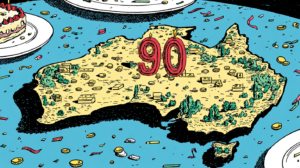If We Ignore Basic Economics, We Will Go Broke
Why should we care about economic literacy? Are we troubled by illiteracy in physics? Or metaphysics? Should we worry that most of us can’t remember much of the periodic chart of the elements? Why should we worry more about economics? Because economic illiteracy is dangerous. I can ride on a roller coaster without understanding centrifugal force. In fact, even if I refuse to believe in centrifugal force and actually create a new religion on that basis, I will probably stay in the roller coaster as I careen around the corner. Physics can protect me, whether I believe it or not. But if I ignore basic economics, I could go broke. And if a country ignores basic economics, it could go bankrupt.
That’s the opening paragraph of an essay titled “Hope and Danger for Economic Literacy” by economist Todd G. Buchholz, one of several fine essays published in the December 1998 issue of The Region, a quarterly journal of the Federal Reserve Bank of Minneapolis. The issue was devoted to what Americans know, don’t know, and should know about economics.
Buchholz is right. The level of economic knowledge will make or break an individual or a nation of individuals. When people understand the subject, its principles, and its implications, they can raise the standard of living and solve problems.
When people don’t understand economics, they gullibly embrace “quick fix” promises that erode the standard of living and blindly support impractical “pie-in-the-sky” solutions that make problems multiply and worsen.
So economic education is important, and Americans today need heavy doses of it. Ordinarily, it might make sense to recommend that Americans pick up a high school economics text and read it from cover to cover. Sadly, that would be very poor advice.
My colleague Burton Folsom has directed a Mackinac Center for Public Policy review (written with George Leef and Dirk Mateer and released this month) of 16 of the top-selling high school economics textbooks. Folsom found only six texts he could grade either A or B for economic accuracy. Each of the rest rated a C, D, or F. If he hadn’t been generous enough to grade on the curve, more than half might have flunked.
Errors abound in the texts students are using in high school economics classes, more than an entire issue of The Freeman could address. What follows is a small sample of the worst ones. These statements are so inexcusably erroneous that they have no business appearing in print on any page of an economics text worthy of the name.
“As societies become more complex, the need for government power tends to increase.” From Sanford Gordon and Alan Sanford’s Applying Economic Principles, this little canard is tossed out in a matter-of-fact, everybody-knows-it fashion.
Are these guys utterly unaware of F. A. Hayek’s withering critique of central planning? (Hayek and most economists would surely dismiss the statement as a “pretense of knowledge” if there ever was one.) Have Gordon and Sanford never heard of public choice, the school of thought within economics that explains the inherent defects in government action? Do they not know that one of the many reasons for the collapse of the Soviet socialist empire was the utter incapacity of the state to keep up with the information and innovations of competitive markets?
FEE’s Leonard Read demolished this simplistic notion decades ago by pointing out that the impossible task of one person’s planning the life of another is made even more hopelessly complex when a handful of people in government set out to plan the lives of millions. “Obviously, the more complex our economy, the more we should rely on the miraculous, self-adapting processes of men acting freely,” wrote Read.
“Despite fears by some Americans that governmental tampering with the free enterprise system would be harmful, most government policies have met with success.” David E. O’Connor, with a straight face, asks us to believe this statement in his text, Economics—Free Enterprise in Action.
Government doesn’t always fail, to be sure—especially if you’re not picky about what “failure” means. But the track record hardly suggests that “most” of its policies have been successful. Education? Studies show the more government spends and meddles, the worse the schools get. Money? At least seven or eight recessions, a Great Depression, and a currency worth a nickel of its value when the Federal Reserve System was established does not add up to success. Poverty? We now know beyond dispute that $5 trillion in poverty spending only exacerbated the problem. On and on it goes, but you get the picture.
“During the Industrial Revolution, ‘wages were so low that sometimes entire families had to work.’” Richard Hodgetts and Terry Smart employ this assertion in their text, Economics, to imply to the reader that the Industrial Revolution set society back because it made many people work for the first time.
If text authors could be sued for malpractice, Hodgetts and Smart would need skillful attorneys to handle this one. Evidence by the boatload shows that life was far more “nasty, brutish, and short” in the days before industrialization boosted productivity and gave people a chance. Kids did not dance their time away around the maypole in 1400; large numbers of them died before the age of five and those that survived typically labored under appalling conditions and never heard the phrase “summer vacation.”
“Under a balanced budget, the government would ‘not be able to do things that many people think it should do, like building roads and providing for the needy.’” Henry F. Billings, in his Introduction to Economics, apparently believes either a) when government runs a deficit so that it can spend more than it raises in taxes, we get the extra goodies for free, or b) people have to be bamboozled into programs they wouldn’t want to pay for.
After 30 years of nonstop deficit spending, no intelligent adult has a legitimate excuse for thinking that red ink makes anything cheaper or more readily available. A balanced budget means taxpayers pay now for what they get from government. Deficit spending simply means that today’s taxpayers get the goodies and tomorrow’s get the bills, plus a hefty interest charge.
How does this junk—and so much more, as documented in Folsom’s study—find its way into high school economics texts? One reason is that high school teachers drive the market, and few of them who are asked to teach economics have either majored in the subject at college or have demonstrated any particular competence in the field. Publishers even assemble focus groups of such teachers; if they say, “We like the minimum wage!” then that’s what the authors of texts are told to include in the books.
Another reason is the general level of economic ignorance throughout our society. It’s an enduring, pandemic affliction that underscores the need for the work of organizations like FEE.




